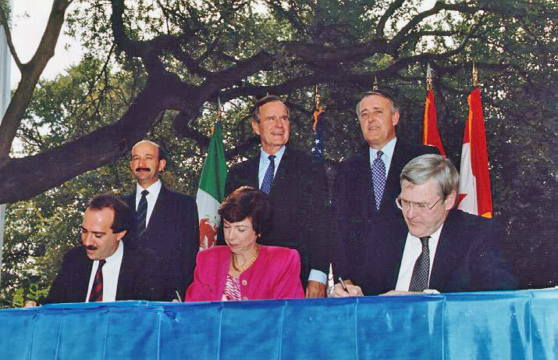
What are the Best Options for Modernizing NAFTA?
How significant of a priority should strengthening NAFTA be as compared to other trade agreements?
"Donald Trump’s new trade policy can be an opportunity for Korea to expand its reach to the Latin American market.”
During an exclusive interview with Maeil Business, Michael Shifter, President of the Inter-American Dialogue, a think-tank based in Washington DC, said that the Trump administration’s policies such as the renegotiation of NAFTA could have positive effects.
He participated as a keynote speaker at the ‘2017 Korea-LAC Future Cooperation Forum’ which was jointly hosted by the Ministry of Foreign Affairs and Korea International Trade Association from June 28 to June 30.
Mr. Shifter said that concerns regarding the renegotiation of NAFTA were causing positive changes that could make the issue in question an opportunity in disguise.
“Latin American countries vulnerable to Trump’s protectionist policies, such as Mexico, are creating new partnerships in search of alternative markets.”
He said that Trump’s new policies could make way for Latin American economies, traditionally dependent on the US and raw materials, to become stronger through industrial diversification. He added that these efforts would provide an opportunity for Korea to strengthen its relations with Latin American countries and widen its foothold in the Latin American market.
On NAFTA renegotiations, he explained that “the termination of NAFTA means losing 5 million American jobs” continuing that “renegotiations that are set to begin in August will probably entail small modifications rather than profound changes.”
He stressed that this would be an opportunity for third country companies (including Korean firms) to target the Latin American market, a market that is recently experiencing a growth in the middle class. He said that “although Latin American countries are marked by social inequality and bipolarization, levels of inequality decreased during 2002 to 2012 when these countries experienced economic growth” adding that “those people who have escaped poverty are actively purchasing consumer goods.”
Mr. Shifter also stressed the importance of the Fourth Industrial Revolution and the possibility of Korea-Latin America cooperation in this area.
He said that “even Latin American companies understand the importance of the Fourth Industrial Revolution and the fact that the inability to keep up with this technology equals losing global competitiveness.” He then continued explaining that “Korea is regarded as an interesting partner to cooperate in areas such as biotechnology, clean energy and information economies.
Underlining the importance of infrastructure in order to promote the Fourth Industrial Revolution, he gave the example of Peru as a potential partner for Korean firms, citing the country’s interest in expanding its business telecommunication capabilities.
However, he warned that “notwithstanding the creation of new markets and the proactive attitude of Latin American governments in this area, there is still the risk of market contraction” and advised that “Korean firms should take into account the political and economic situation in each country as well as the ability of governments to take action.”
경제호황으로 중산층 급부상…산업구조 다양화 가능한 시점
한국기업 새 시장 열릴수 있어…4차산업혁명분야도 협력 기대
How significant of a priority should strengthening NAFTA be as compared to other trade agreements?
How will the change affect the countries’ trade relationship? What will be the economic impact in the United States and Mexico?
Michael Shifter fue entrevistado por Gerardo Torres de El Salvador sobre los temas más destacados en la agenda regional. Entre otros asuntos, Shifter habló sobre el futuro de la paz en Colombia, la crisis política y económica en Venezuela, y el impacto de las elecciones de Estados Unidos en la región.
 sinano1000 / Flickr / CC BY-NC-ND 2.0
sinano1000 / Flickr / CC BY-NC-ND 2.0

